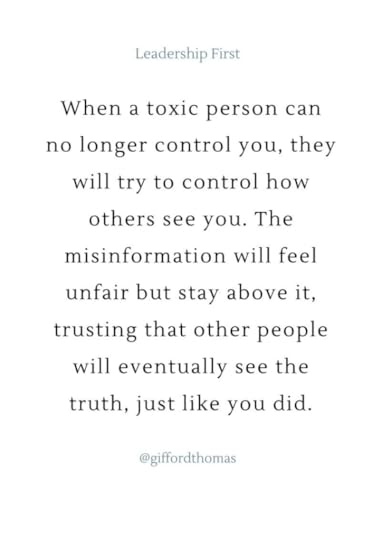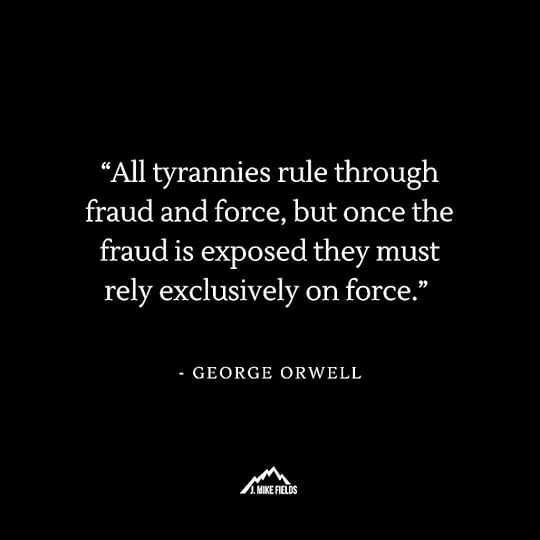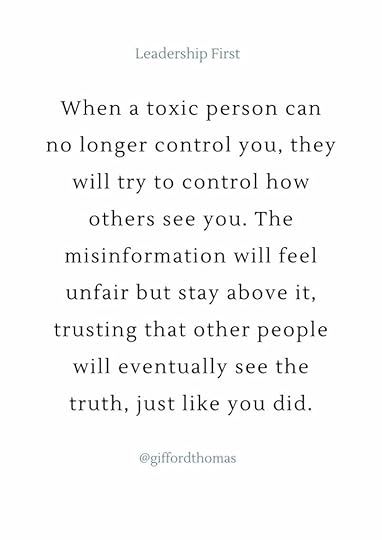Gordon Graham's Blog, page 3
June 9, 2023
Play Your Position
Mary Lou Kayser is the host of the “Play Your Position” podcast. I was very fortunate to be her guest on February 15 of this year. Mary Lou has over 25 years of experience in corporate and entrepreneurial settings. In addition to being a podcast host, she is a coach, speaker and author who is passionate about helping mid to senior level professionals build their legacy projects and make a meaningful impact in the world. I am extremely grateful that she thought my book was worthy of discussion on her program.
http://playyourpositionpodcast.com/gordon-graham/
Stay Courageous,
Gordon
May 29, 2023
There, but for the grace of God …..

Chelsea Jay, Career and Leadership Coach, recently conducted a survey on LinkedIn with only one question:
“Have you or someone you’ve known ever worked in a toxic environment?”
She left it open for a week and then posted the results. 551 people responded with 99% expressing the belief that they, or someone they’ve known, had worked in a toxic environment. If believed, a maximum of 6 people out of the 551 respondents felt they had worked in something other than a toxic workplace.
Pretty incredible.
You can extrapolate those results ad infinitum. For instance, out of 50,000 employees only 500 might feel that they are working in a supportive workplace!
But, what really constitutes a “toxic” workplace? Not to discount any of the responses to Chelsea’s survey, but identifying a work environment as toxic is really a damning diagnosis and should not be taken lightly. You can’t simply say “my workplace is toxic” solely because you were criticized and/or your feelings got hurt.
Chelsea makes the concession that “toxic” means different things to different people, but that it is actually a set of behavioral traits and actions. And ….. it can come from ANYONE (CEO, Director, Mid-level Management, HR, front line staff, etc.).
Those behaviors can include:
Name calling; (public persecution to demean you)Microaggressions; (comment or action that expresses prejudice)Intentionally embarrassing colleagues and staff; (see Name Calling above)Participating in and spreading rumors; (creating perceptions that become reality)Unequal treatment; (undeserved promotions, bypassing deserved promotions)Gaslighting when issues are brought to the table; (psychological manipulation)Intimidating others (raising your voice or threatening).These behaviors contribute to overall organizational dysfunction by:
Spreading fear in the workforce;Inducing self-doubt by causing employees to question their capabilities and self-worth;Discouraging self/team advocacy;Making employees feel hopeless/worthless;Creating unsafe spaces with no place for professionals to thrive and grow;Creating tensions.These behaviors are intentional. Purposeful. Not occasional or accidental. They become what defines your organization. And, if not corrected, they ultimately affect the mission, vision and strategy of the company. They become the culture, or vice versa.
Another LinkedIn post from Chelsea Jay implied that she had produced a list of “pros” for staying in a toxic work environment. When the reader scrolled down to read the list they found one short sentence:
“There are none”.
Stay Courageous,
Gordon
May 15, 2023
Oops!
I provided the same link three times at the end of my post earlier today. No need to read the same thing three times! No excuse. I obviously did not test all of the links. My apologies.
The Learning Leader

Last time we talked about how important listening is to inspirational leadership. This time let’s consider different aspects of intelligence and its role in achieving leadership maturity.
Intelligent Leaders Understand How Much They Don’t Know – Highly intelligent people don’t try to act as if they know everything, even on topics where they may have serious convictions. If you do not recognize that you have limits, you may not be open to learning from other individuals and/or situations.Intelligent Leaders Have Insatiable Curiosity – Naturally curious and always eager to learn more, intelligent leaders are not content to accept things at face value. They are constantly striving to stay up-to-date on the latest developments in their field and to think critically about the world around them. The alternative, of course, is rigid rejection of anything that contradicts what you [think you] believe. Intelligent Leaders Have Self-Control – Having self-control is a sign of intelligence because it means you’re more likely to think before you speak or act. Generally, “smart” people are able to overcome impulsiveness by planning, clarifying goals, exploring alternative strategies, and considering consequences before they begin.Intelligent Leaders Have Empathy And Understanding – This is, perhaps, the companion trait to effective listening. Highly intelligent individuals are often able to put themselves in others’ shoes, understanding and empathizing with their feelings and experiences. This allows leaders to connect with others and to build strong, supportive relationships.I gleaned much of this from the sources below. They also provide great content for further research on your part.
Stay Courageous,
Gordon
May 1, 2023
Holding Space
“I get it. It sucks. Being the first to set aside the argument and attempt to understand someone, to truly listen, is a tough thing to do. It feels like a bitter pill to swallow. But it’s also the most important. Someone has to take the first step. Someone has to be the bigger person. This is an invitation for you to be that someone.”
Jen Underwood, Reclaiming The Lost Art of Listening
________________________________________
We have created a crisis of listening.
What does that mean? Well, due to biases, preconceived notions, doctrine, impatience, or a myriad of other reasons, we simply do not listen to each other.
Now…… you are sitting there thinking “that’s simply not true in my case, of course I listen”!
But you don’t ….. and I don’t. Think about how many times someone has started to talk to you and, long before they have finished, you feel like you need to argue or inject your own opinion. One contemporary example is when someone is expounding on a topic on television and you realize that you do not agree. Suddenly you are yelling at the television, arguing with an opponent that can’t hear or see you and who will not respond directly in any way. Did you really listen?
It’s much worse if you are having an in-person interaction and the other party is not an inanimate object like the television.
One common reaction to this observation is “so what”? So I’m a little rude. I just don’t have the time to suffer fools or listen to things that I know are wrong in the first place. Are you beginning to see the problem? We’ve grown so sure of ourselves, so polarized and entrenched in perspectives that we believe that we are always right. That makes it very easy to dismiss any other opinion out of hand …… and to refuse to listen.
I see this more in people who possess and exercise power than I do regular folks. The best example I can provide is directly from my book “The Intrepid Brotherhood” when I arranged to meet with our CEO to discuss how the company could strategically leverage information technology resources. He was quite obviously not ready to listen. He had his mind made up before I opened my mouth. In toxic leaders, this is usually an example of the narcissism that they all seem to labor under. The ability to listen is absolutely critical if you want to be a successful leader.
I already quoted from Jen Underwood’s great piece on this topic. Here’s the rest:
https://medium.com/the-mission/reclaiming-the-lost-art-of-listening-3b894d644ba7
And, a great analysis from Kbqwrites on the decline of healthy communication:
Talking & Listening: The Decline of Healthy Communication – Pyjamas & Tea (pyjamasandtea.com)
Stay Courageous,
Gordon
April 19, 2023
New Review
Unscheduled blog post today. I just received this news.
I am extremely pleased to share that “The Intrepid Brotherhood” received another 5-star review, this time from The Online Book Club. Here is the link to the entire review:
https://forums.onlinebookclub.org/viewtopic.php?f=24&t=304559
Stay Courageous,
Gordon
April 10, 2023
When You Suddenly Realize You Are In The Barrel

From Chelsea Jay, Career and Leadership Coach:
“If you or someone you know is currently contemplating whether to leave or stay in a toxic work environment, here are my Top 3 Facts for you to consider…
👉🏾 Fact 1- It doesn’t get better (just trust me on this…)
👉🏾 Fact 2- You can’t fix it by yourself (it takes a collective team effort)
👉🏾 Fact 3- Money (aka a paycheck) doesn’t justify tolerating abuse (don’t make this a habit)
👉🏾 Bonus Fact- Just because you “ignore it” or “stay out of it” doesn’t mean it’s not affecting you (hello internal damage!)
I hope this helps you with your decision-making.
If you know a friend or someone in your network that needs to hear this… pass it along!”
Keeping with the same theme, you can find my Four Action Strategies for dealing with a toxic work environment on my website www.intrepidbrotherhood.com.
Stay Courageous,
Gordon
March 27, 2023
I Wish I Had Written This Myself
From Gifford Thomas’ Inspirational Leader, but it feels like it is straight from my story.

March 13, 2023
It’s March
That can mean different things to each of us, including the beginning of daylight savings time, the first signs of spring’s approach, longer days and warmer temperatures, etc. For me, March is all about the NCAA basketball national championship tournaments. My favorite men’s college basketball team for decades has been the Gonzaga University Bulldogs. I’ve been a fan since long before their unlikely and remarkable “Cinderella” tournament run in 1999.
The reason this topic can have significance in discussions of organizational and leadership success is because basketball, perhaps more than any other sport, can be the perfect example of what can be accomplished if every member of a team is fully invested in achieving the absolute most that they possibly can. Certainly basketball, like most other sports, is host to many stellar individual performers. Sometimes that is all fans and observers notice. Indeed, the 2020-21 Gonzaga Bulldogs roster included a freshman phenom named Jalen Suggs.
Jalen is an extraordinary athlete and was a designated “one-and-done”, meaning he would spend one year in college basketball and then enter the NBA draft. He had his standout performances and buzzer-beater shots that year – his ESPN SportsCenter moments. He and his teammates went 35 and 1 that season, and the one loss was the ultimate last game of any team’s season – the NCAA championship game. Up to that point, this team had won all of their previous 35 games. It is easy to say that it was teamwork that accomplished that feat, but it comes across like a platitude unless you dig a little deeper.
Imagine being part of a team that is steamrolling through whatever challenges are put in front of you. You might be tempted to start believing that there is nothing that can stop you. The circumstances might seduce you into thinking you have achieved everything that you possibly can, both individually and collectively, in terms of working together. This team, specifically the players on this team, did not fall into that trap.
There is an oft forgotten statistic in basketball called “assists”. Sportscasters and analyst mention assists frequently in the overall profiles of players that standout. But generally, to the normal fan, assists are sort of like opening the car door for someone. It’s nice, but doesn’t contribute directly to the operation of the vehicle. The most that you notice, sometimes, is that someone made a nice pass. You don’t always make the connection between that pass and the basket that the recipient made. Once the points are scored, attention turns to the player who scored them. But coaches know that successful execution of assists can determine the outcome of a game.
At some point during their undefeated season, the players on the 2020-21 Gonzaga Bulldogs began to analyze game films in a somewhat different fashion. They started concentrating on improving “assists”. They critiqued how they might have passed to an open player rather than taking a lower percentage shot. They looked at how to improve anticipation of defensive players moving into passing lanes. They improved recognition of drawing extra defenders on drives creating the opportunity to pass to an open man. They made the commitment to communicate more on the court to minimize errant passes. No judgment of past performances. They concentrated solely on improving team performance by helping individuals realize their goals to be better. Coaches know that improvement in assist-to-turnover ratio can produce victories. So, seeing the player initiated effort to collectively make each of them better individually, they essentially got out of the way.
There really are leadership lessons everywhere.
BTW, the 2022-23 version of this team tips off this Friday, March 17th at 4:35PM to see how deep they can go.
Stay Courageous,
Gordon
February 28, 2023
Business Therapy
Hey gang! I just participated in this interview with Jon and Sam last Friday. Their show is called “Business Therapy: the show that helps business professionals solve real business problems”. It was great fun being challenged by these two very capable consultants. They will definitely keep you on your toes! I hope you like it.
Stay Courageous,
Gordon



